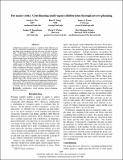Too many cooks: Coordinating multi-agent collaboration through inverse planning
Author(s)
Wang, RE; Wu, SA; Evans, JA; Tenenbaum, JB; Parkes, DC; Kleiman-Weiner, M; ... Show more Show less
DownloadPublished version (979.2Kb)
Publisher with Creative Commons License
Publisher with Creative Commons License
Creative Commons Attribution
Terms of use
Metadata
Show full item recordAbstract
© 2020 International Foundation for Autonomous Agents and Multiagent Systems (IFAAMAS). All rights reserved. Humans collaborate in dynamic and flexible ways. Collaboration requires agents to coordinate their behavior on the fly, sometimes jointly solving a single task together and other times dividing it up into sub-tasks to work on in parallel. We develop Bayesian Delegation, a learning mechanism for decentralized multi-agent coordination that enables agents to rapidly infer the sub-tasks that other agents are working on by inverse planning. These inferences enable agents to determine, in the absence of communication, whether to plan jointly with others or work on complementary sub-tasks. We test this model in a suite of decentralized multi-agent environments inspired by cooking problems. To succeed, agents must coordinate both their high-level plans (sub-task) and their low-level actions (avoiding collisions). Including joint sub-tasks in the prior of Bayesian delegation enables agents to carry out sub-tasks that neither agent can finish independently. The full system outperforms lesioned systems that are missing one or more of these capabilities.
Date issued
2020-01-01Department
Massachusetts Institute of Technology. Department of Brain and Cognitive Sciences; Massachusetts Institute of Technology. Computer Science and Artificial Intelligence Laboratory; Center for Brains, Minds, and MachinesJournal
Proceedings of the International Joint Conference on Autonomous Agents and Multiagent Systems, AAMAS
Citation
Wang, RE, Wu, SA, Evans, JA, Tenenbaum, JB, Parkes, DC et al. 2020. "Too many cooks: Coordinating multi-agent collaboration through inverse planning." Proceedings of the International Joint Conference on Autonomous Agents and Multiagent Systems, AAMAS, 2020-May.
Version: Final published version